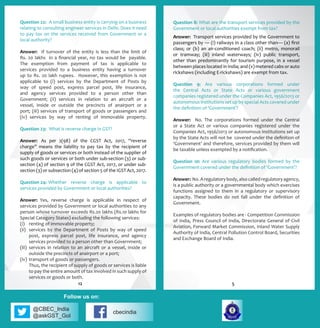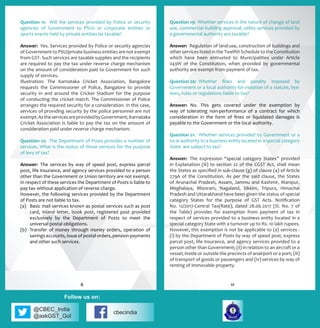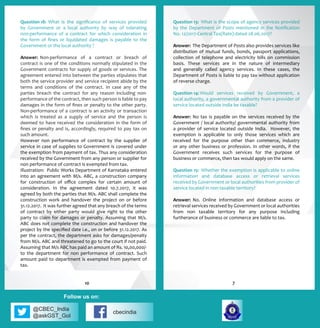This document provides answers to frequently asked questions regarding government services and GST. It explains that not all services provided by the government or local authorities are exempt from GST. It clarifies the meaning of key terms like "government" and "local authority" under the GST Acts. It also discusses the tax treatment and compliance requirements for government departments and authorities in relation to supplying services, deducting tax at source, and obtaining registrations.


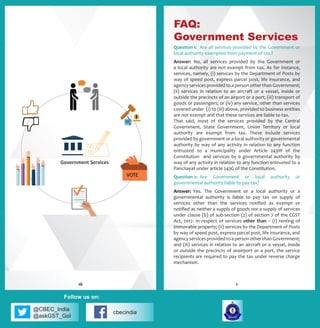
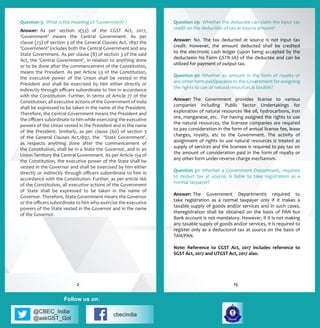

![@CBEC_India
@askGST_GoI
cbecindia
Follow us on:
Question 6: Would a statutory body, corporation or an
authority constituted under an Act passed by the Parliament or
any of the State Legislatures be regarded as ‘Government’ or
“local authority” for the purposes of the GST Acts?
Answer: A statutory body, corporation or an authority created
by the Parliament or a State Legislature is neither ‘Government’
nor a ‘local authority’. Such statutory bodies, corporations or
authorities are normally created by the Parliament or a State
Legislature in exercise of the powers conferred under article
53(3)(b) and article 154(2)(b) of the Constitution respectively.
It is a settled position of law (Agarwal Vs. Hindustan Steel AIR
1970 Supreme Court 1150) that the manpower of such statutory
authorities or bodies do not become officers subordinate to the
President under article 53(1) of the Constitution and similarly
to the Governor under article 154(1). Such a statutory body,
corporation or an authority as a juridical entity is separate
from the State and cannot be regarded as the Central or a
State Government and also do not fall in the definition of ‘local
authority’. Thus, regulatory bodies and other autonomous
entities would not be regarded as the government or local
authorities for the purposes of the GST Acts.
Question 7: Would services provided by one department of
the Government to another Department of the Government
be taxable?
Answer: Services provided by one department of the Central
Government/StateGovernment to another department of the
Central Government/ State Government are exempt under
notification No. 12/2017-Central Tax (Rate), dated28.06.2017 [S
No 8 of the Table].
However, this exemption is not applicable to:
(a) services provided by the Department of Posts by way of
speed post, express parcel post, life insurance, and agency
services provided to a person other than the Central
Government, the State Government and Union Territory;
(b) services in relation to a vessel or an aircraft inside or
outside the precincts of a port or an airport;
(c) services of transport of goods and/or passengers.
Question 25: What is the scope of ‘pure services’ mentioned
in the exemption notification No. 12/2017-Central Tax (Rate),
dated 28.06.2017?
Answer: Inthecontextofthelanguageusedinthenotification,
supply of services without involving any supply of goods would
be treated as supply of ‘pure services’. For example, supply
of man power for cleanliness of roads, public places, architect
services, consulting engineer services, advisory services, and
like services provided by business entities not involving any
supply of goods would be treated as supply of pure services.
On the other hand, let us take the example of a governmental
authority awarding the work of maintenance of street lights
in a Municipal area to an agency which involves apart from
maintenance, replacement of defunct lights and other spares.
In this case, the scope of the service involves maintenance
work and supply of goods, which falls under the works contract
services. The exemption is provided to services involves only
supply of services and not for works contract services.
Question 26: Would services in relation to supply of motor
vehicles to Government be taxable?
Answer: Supply of a motor vehicle meant to carry more than
twelve passengers by way of giving on hire to a state transport
undertaking is exempted from tax. The exemption is applicable
to services provided to state transport undertaking and not to
other departments of Government or local authority. Generally,
suchStatetransportundertakings/corporationsareestablished
by law with a view to providing public transport facility to
the commuters. In some cases, transport undertakings hire
the buses on lease basis from private persons on payment of
consideration. The services by way of supply of motor vehicles
to such state transport undertaking are exempt from payment
of tax. However, supplies of motor vehicles to Government
Departments other than the state transport undertakings are
taxable.
134](https://image.slidesharecdn.com/103-faqs-government-services-201010111948/85/103-faqs-government-services-6-320.jpg)
